

17 03 21 Gene researchers seek to shield BC fish forests BIV. Climate change impacting freshwater fish populations. Gene researchers seek to shield B.C. fish, forests. Scientists at the University of British Columbia (UBC) will be using genetic research to give natural selection a push in raising fish and growing forests that are more resistant to the ravages of climate change.
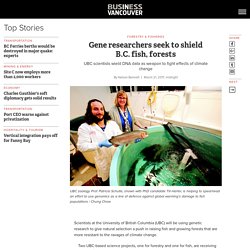
Two UBC-based science projects, one for forestry and one for fish, are receiving more than $10 million in funding from the non-profit research organization Genome BC. Both projects will use genomics – the mapping of the complete DNA sequences of organisms – to identify species that have already become more resistant to the effects of climate change through natural selection, and then give them a push through accelerated breeding. “We are talking about taking advantage of natural variation that’s already present here in British Columbia,” said UBC zoology Prof. Patricia Schulte, who is heading up a 10-person research team that is trying to head off the kind of damage to fish that B.C. has already witnessed in its forests through the mountain pine beetle epidemic. Scientists hope to retool hatcheries with better adapted fish.
About one quarter of the lakes stocked with trout by the Freshwater Fisheries Society of B.C. suffer from increased fish mortality due to highly alkaline lake water.
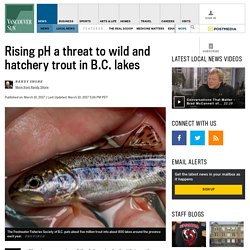
At least 60 lakes in the highest pH category “cannot support effective stocking programs,” said Patricia Schulte, a biologist at the University of B.C. Those lakes are consistently above 9 pH, while another 100 lakes show moderate to high alkalinity, above 8.5 pH, according to the FFSBC. The pH scale is logarithmic, meaning a value of 9 is ten times as alkaline as 8. Rising pH a threat to wild and hatchery trout in B.C. lakes. About one quarter of the lakes stocked with trout by the Freshwater Fisheries Society of B.C. suffer from increased fish mortality due to highly alkaline lake water.
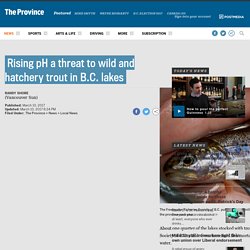
At least 60 lakes in the highest pH category “cannot support effective stocking programs,” said Patricia Schulte, a biologist at the University of B.C. Those lakes are consistently above 9 pH, while another 100 lakes show moderate to high alkalinity, above 8.5 pH, according to the FFSBC. The pH scale is logarithmic, meaning a value of 9 is ten times as alkaline as 8. High pH is is part of a complex interrelationship between low precipitation, water temperature and oxygen levels, driven by climate change. “We know experimentally that of the fish that go into the very high pH lakes a lot of them don’t survive,” said Schulte. Surviving climate change - Lake Country Calendar. The impact of climate change on B.C. freshwater fisheries is the subject of a groundbreaking genetic study.
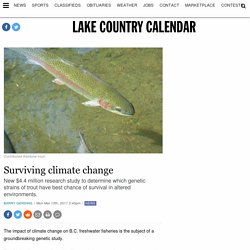
The $4.4 million research study will be carried out over the next four years with a team of natural and social scientists, led by Patricia Schulte, a zoology professor at UBC in Vancouver. The study is funded in part by Genome BC and Genome Canada along with other stakeholders such as B.C. Freshwater Fisheries Society, federal and provincial government agencies, Pacific Salmon Foundation and the Columbia River Intertribal Fish Commission. “In some ways, salmon tend to get all the attention but the freshwater trout fishery in B.C. is very important economically,” said Schulte.
“While we often talk about the commercial fishery, the overall impact of the recreational fishery in B.C. is substantially bigger.” FIS - Worldnews - Genome BC: Climate change impacting freshwater fish populations. Genome BC is designed to provide genomic tools to identify the genes that help some populations of rainbow and steelhead trout | Photo: Genome/FIS Genome BC: Climate change impacting freshwater fish populations CANADA Friday, March 10, 2017, 10:50 (GMT + 9)
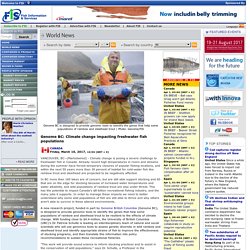
Genome BC: Climate change impacting freshwater fish populations. VANCOUVER, BC--(Marketwired - March 08, 2017) - Climate change is posing a severe challenge to freshwater fish in Canada.

Already record high temperatures in rivers and streams during the summer have forced temporary closures of popular fishing locations, and within the next 50 years more than 30 percent of habitat for cold-water fish like rainbow trout and steelhead are projected to be negatively affected. In BC more than 160 lakes are of concern, but are still able support stocking and 60 that are on the edge for stocking because of increased water temperatures and water alkalinity, and wild populations of rainbow trout are also under threat.
This has the potential to impact Canada's $8-billion recreational fishing industry, and the many jobs it supports. Genome BC: Climate change impacting freshwater fish populations. Genome BC: Climate change impacting freshwater fish populations, The Canadian Business Journal. VANCOUVER, BC–(Marketwired – March 08, 2017) – Climate change is posing a severe challenge to freshwater fish in Canada.
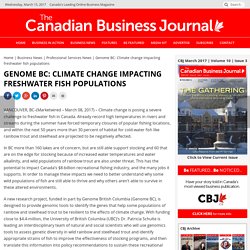
Already record high temperatures in rivers and streams during the summer have forced temporary closures of popular fishing locations, and within the next 50 years more than 30 percent of habitat for cold-water fish like rainbow trout and steelhead are projected to be negatively affected. In BC more than 160 lakes are of concern, but are still able support stocking and 60 that are on the edge for stocking because of increased water temperatures and water alkalinity, and wild populations of rainbow trout are also under threat. This has the potential to impact Canada’s $8-billion recreational fishing industry, and the many jobs it supports.